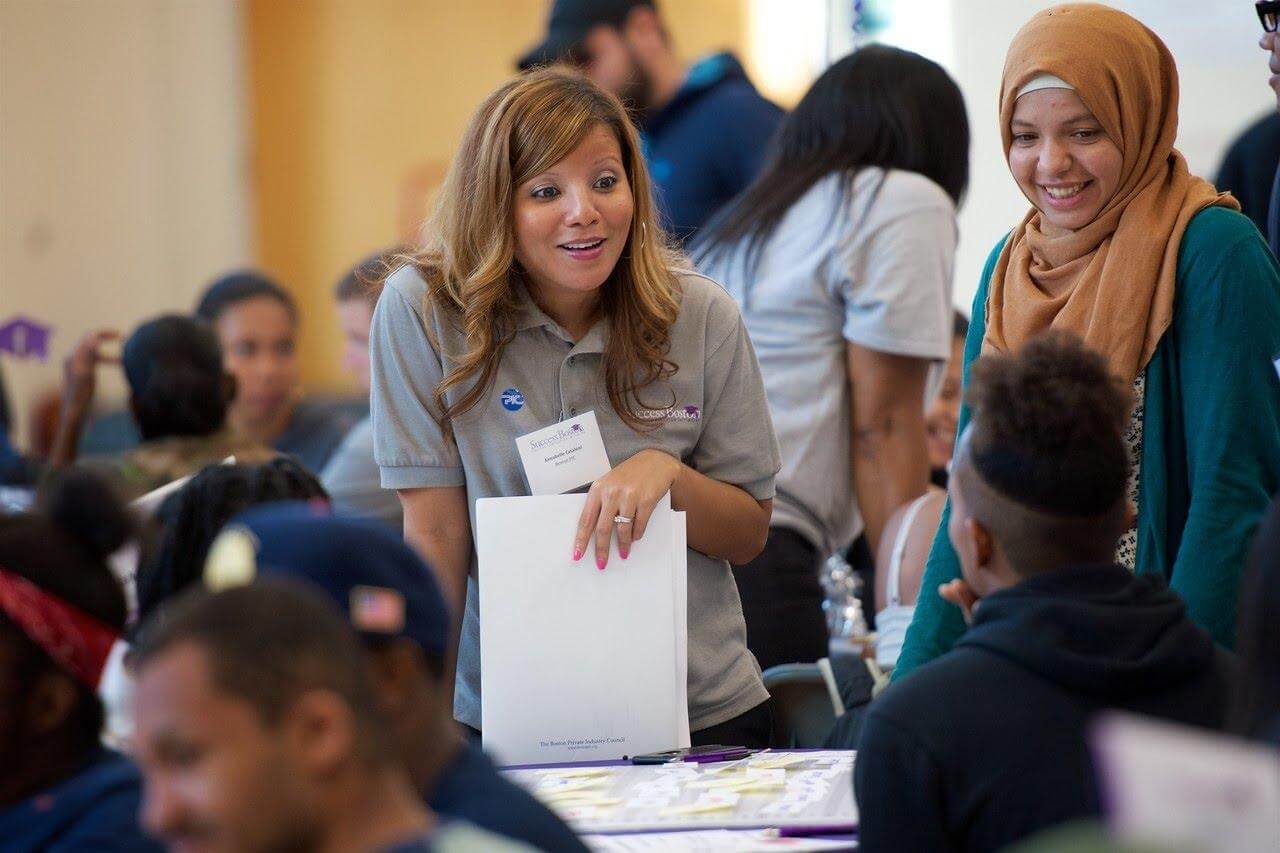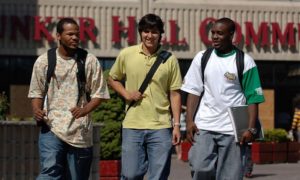Overview
Creating better and more equitable opportunities for students to succeed in their postsecondary journey.
Becoming a Talent Hub allowed us to build on our long history of cross-sector collaboration and to leverage and advance important work underway in four key areas. First, we enhanced communication between Success Boston non-profit coaches and campus leadership, faculty, and advising staff with the goal of ensuring that Success Boston coaching work and campus efforts are well-integrated and synergistic. Second, we implemented a guided and transparent academic pathway between Bunker Hill Community College and UMass Boston. The pathway allows students from Bunker Hill’s most-popular liberal arts major to transfer to the Psychology degree program at UMass Boston. Furthermore, the two institutions strengthened their capacity to advise students on the transfer process more broadly. Third, we built on our work as a former Community Partnership for Attainment site to re-engage BPS students who enrolled in postsecondary education but then stopped out. Through an in-depth study, collaborative Learning Labs, and institutional re-engagement campaigns, we now have a better understanding of how to re-engage stop-out students more successfully. Finally, we continued to work closely with the city and the state to support and strengthen local college affordability programs like the Mayor’s Tuition Free Community College Plan and the Boston Bridge, significantly increasing the number of participating students and higher education institutions.
Outcomes
Key Initiatives
Guided Pathway Development and Transfer Student Advising
To advance this initiative, we formed an 11-person Joint Faculty Team that met regularly to deepen each other’s understandings of the curricular and advising experience at our respective institutions and make the transfer process more transparent for students. As a result of this joint learning process, we created documentation of General Education courses, Bachelor of Arts (BA) Psychology specific major courses, and free elective courses in the social and behavioral sciences that have direct course equivalencies between the two institutions. We also created a course mapping for scope and sequence that included milestone courses and embedded advising and coaching milestones, as well as a visualization of the guided pathway in alignment with BHCC’s current institution-wide, curricular mapping efforts.
Alongside, to strengthen transfer student advising, another 13-person Joint Advising & Coaching Team used a landscape assessment of admissions/entry, orientation, and advising processes to identify and prioritize a number of recommendations and actions for a clear and concise transfer handoff. These included a 5-Step Transfer Tip Sheet for BHCC students intending to transfer to UMass-Boston and a FAQ Sheet outlining eligibility requirements, benefits, and application instructions for programs such as the Boston Bridge, Tuition Free Community College, Mass Transfer A2B, and Commonwealth Commitment. Finally, we reviewed and edited the Liberal Arts to Psychology course map with embedded advising and coaching milestones, to be inclusive of part-time students and current advising and coaching roles and responsibilities.
Re-engaging Students Who Stopped Out
A key initiative of our Talent Hub work focused on students who enrolled in postsecondary education but then stopped out. Researchers at UMB, BHCC, and the Boston Private Industry Council collaborated on an in-depth study of stop-out students at the two institutions, including factors that are most likely to predict both stopping out and re-enrolling. Using lessons learned from this study, Success Boston hosted a virtual learning lab on ways to understand and support these students more effectively. (This Learning Lab is part of a series of convenings on this topic that partners have led prior to the Talent Hub work.) A critical part of the learning lab was an interactive workshop on how to adopt equity-minded practices in higher education and student supports, led by Bunker Hill Community College and UMass Boston. Meanwhile, UMB also launched an intensive re-engagement campaign to reach out to these students and support them in the re-enrollment process. As a result, UMB has experienced a 9% increase in the number of students who had stopped out but then re-enrolled to continue their education.
Strengthening the Success Boston Coaching Network
As part of the Talent Hub activities, partners made great strides in strengthening, professionalizing, and formalizing a learning network and community of practice that Success Boston has been convening for coaches, advisors and other student-support staff for years. The Talent Hub allowed to bring this work to the next level in a number of ways. Establishing a more intentional connection with campus staff, including through designated higher education liaisons on campus, has resulted in coaches from nonprofit organizations being much more informed about and connected to both staff and resources available on campus. The coaching network also formalized a schedule and curriculum for its monthly coaching meetings and inaugurated an annual multi-day Summer Institute to provide in-depth training, onboarding, and networking opportunities to both veteran and new staff. Success Boston has held a Summer Institute every year since we joined the Talent Hub, and we continue to strengthen and adapt its curriculum to provide the most up-to-date and relevant training to coaches. Without the Talent Hub network and support, building out this network and its activities would have been far more challenging.
Partners

Featured
Bunker Hill Community College
The largest community college in Massachusetts, with more than 19,000 students enrolled annually. With two main campuses in Charlestown and Chelsea, three satellite campuses and several instructional centers, BHCC offers multiple learning options to suit its diverse student body. Students can choose from day, afternoon, evening, late-evening, weekend, web-based and distance-learning courses to fit their busy schedules. BHCC offers more than 100 academic programs, including associate degree programs, certificate programs and programs designed to allow students to complete their first two years of a bachelor’s degree before transferring to a four-year university. BHCC’s partnership with UMB as part of the Talent Hub allowed the two institutions to develop a pilot guided pathway for liberal arts majors, strengthen the broader transfer student advisory process, and gain a deeper understanding of stop-out students.



